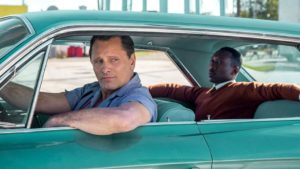Green Book
Posted on November 15, 2018 at 5:50 pm
A-| Lowest Recommended Age: | Middle School |
| MPAA Rating: | Rated PG-13 for thematic content, language including racial epithets, smoking, some violence and suggestive material |
| Profanity: | Strong language including racist epithets |
| Alcohol/ Drugs: | Drinking, smoking |
| Violence/ Scariness: | Some peril and violence |
| Diversity Issues: | A theme of the movie |
| Date Released to Theaters: | November 16, 2018 |
| Date Released to DVD: | March 11, 2019 |

Next, the movie is co-written by the real-life son of Tony Lips (real name, Tony Vallelonga), so there was a high risk of a lack of perspective, and probably a lack of experience. And the director, Peter Farrelly, is known for working with his brother, Bobby, on movies known for often-shockingly crude humor like “There’s Something About Mary,” “Dumb and Dumber,” and “Movie 43.”
And yet, they pulled it off. “Green Book” is wonderfully entertaining and guaranteed to warm even the hardest of hearts. The music is sublime, and the performances by Mahershala Ali as Don Shirley and Viggo Mortensen as Tony Lips are superb. Yes, lessons will be learned and racial harmony will be kumbaya-ed, but resistance is futile. This movie will win you over.
Tony needs a job, but not badly enough to accept an offer from some mob-connected friends. When he hears that a doctor needs a driver, he goes to the address for the interview and it is not a home but the legendary Carnegie Hall. It turns out that Don Shirley lives above the performance space, in an apartment filled with antiques and objects d’art. He is (twice) a doctor of music. He appears in a gold and white caftan and conducts the interview from an actual throne. He is sophisticated and a little effete. He is, as is usually the case in road and buddy movies and especially in buddy/road movies, the id to Tony’s unrestrained ego. He immediately knows that Tony is not the right guy and turns him down. But later, he offers him the job, even though when he tells Tony he is going South, Tony thinks he means Atlantic City.
It is 1962. The Civil Rights Act has not yet passed, meaning that the Jim Crow segregation laws are still in effect throughout the South, and there are very few hotels and restaurants that allow black customers. Don will be traveling with two other musicians (the group is called the Don Shirley Trio), and they are white and driving a separate car. The record label guy gives Tony a copy of the Green Book, a travel guide for black Americans who wish to “vacation without aggravation.” And he tells Tony that if Don does not make every single performance on the schedule, he will not get paid.
Tony, in an early scene put a glass in the garbage because a black plumber working in his kitchen drank some water from it, has lived a life as insular as Don’s has been urbane. Tony is expansive and chatty. Don is reserved and cerebral. Tony is devoted to his wife and family. Don is a loner. Tony loves food. Don loves music. Ahead are plenty of conflicts with each other and plenty of conflicts that will put them on the same side against pretty much everyone.
It teeters toward overly cutesy at times, as when Tony teaches Don the joys of fried chicken. But we see Tony’s spirit enlarge as he sees for the first time the beauty and brutality of America outside of New York, as he is touched by the music and Don’s artistry and horrified by the bigotry he faces. And we see Don open up a little to someone outside his world. Watching that opens our hearts a little, too.
Parents should know that this film includes depiction of Civil Rights Era racism with some peril and violence, strong and racist language, drinking, smoking, some sexual references and non-explicit situation.
Family discussion: Why did Don Shirley pick Tony? If you wrote a movie about your parents, what would it be?
If you like this, try: listen to the music of the Don Shirley Trio and watch “In the Heat of the Night”
